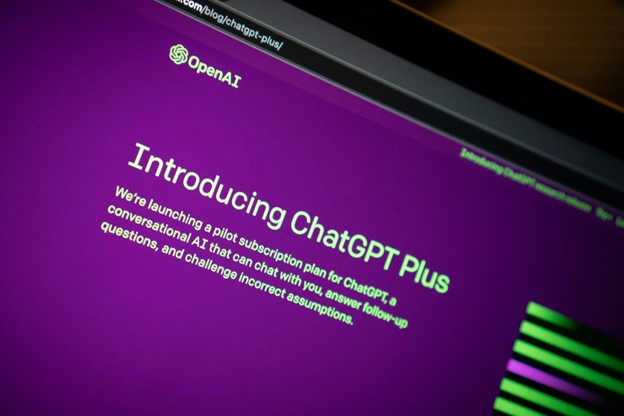In late 2022, it seemed like the world shifted overnight—though thankfully, this time, it wasn’t due to a rapidly spreading, life-threatening illness. No, this time, the shift was to our sudden awareness and obsession with AI.
Whether you loved the idea or hated it, are tech-obsessed or not, in November 2022, AI was likely on your radar and occupying your mind.
This sudden change was all thanks to the viral launch of ChatGPT-3, a generative AI chatbot that represented a fountain of opportunity akin to the Industrial Revolution.
Just like the Industrial Revolution, the advent of AI has been riddled with worries and concerns around the larger risks it might pose to society and, more urgently, how it will impact people’s job security.
More than a year later, many are still obsessed with the subject of AI, with the possibility of it disturbing the job market, particularly for freelancers, still being a hot topic. But how exactly could AI, ChatGPT specifically, spell the end for freelancers? Let’s take a closer look.

Table Of Contents 👉
How AI Tools like ChatGPT Are Competing with Freelancers
AI has become a massive component of tech updates for businesses and organizations, from debugging coding and IT issues to taking on customer service inquiries.
The capabilities of AI are being applied to a massive range of industries and becoming the norm, with 42% of businesses already integrating its use into their operations—meaning that fears surrounding job security are well founded.
ChatGPT’s algorithms sort through online information and the program’s data sets differently than a search engine. It uses its deep learning model to find patterns in information for a comprehensive response to a question or prompt rather than listing links related to keywords and phrases.
This results in a range of uses where you can get answers to questions and even full-blown solutions like program coding for a website or an in-depth article, depending on how you prompt the program.
This quality is what’s giving freelancers a run for their money. Generative AI provided by ChatGPT can be used to:
- Write code
- Develop and brainstorm ideas
- Write content like articles, scripts, blog posts, and social media posts
- Create a comprehensive travel plan
- Develop surveys and quizzes
- Research and explain complex topics
- Analyze and assess data
- Translate text
All this means that tasks normally outsourced to a person can be produced through ChatGPT almost instantly. Oh, and the basic version of ChatGPT can do these things for free, reducing the need for businesses and organizations to seek out freelance writers, editors, marketers, programmers, and many other roles.
It even reduces the need for people to seek out gig workers in their personal lives. You no longer need a travel planner to develop the ideal travel itinerary or find a tutor to help you through challenging subjects at school. ChatGPT can do that all for you.
Add in that new AI developments from ChatGPT are making it easier to use and more reliable, and you can see even more clearly how AI tools will knock freelancers out of the running for projects.
Where ChatGPT Is Falling Short (For Now)
Now that we’ve explored ChatGPT’s capabilities, which are making it a fierce competitor of freelancers everywhere, it’s time to acknowledge that, at least for the time being, ChatGPT is far from perfect.
While the quality of the content ChatGPT produces has already seen massive improvement, a few notable things set ChatGPT’s generated content apart from human-generated content, including the fact that ChatGPT often still sounds robotic.
It uses repetitive structures, particularly impacting long-form content, with a tell-tale written-by-AI style that doesn’t always deliver on narrative or story building. It relies on cliches—which, when used sparingly in content, is entertaining but becomes tiring and uninteresting when overused.
Plus, content is run of the mill, based on the AI language text predictions, where it aims to use the most used or expected text option rather than the most interesting or engaging.
Criticisms of ChatGPT’s biases have come to light since its viral launch, highlighting concerns about the potential to develop harmful and discriminatory content. While OpenAI has worked to help correct these biases, it still has the potential to create swayed content.
Accuracy of content, from new research or changes in certain industries to considering the larger context of information, is a considerable concern with ChatGPT. Because of this, it’s still recommended that the information it spews out is verified and not taken at face value.
In many situations, finding well-researched content is still best. Because of ChatGPT’s inaccuracies, you’ll find yourself turning to resources developed by real people and tools beyond AI for some tasks.
For instance, if you want to stay up to date on the news and global affairs from journalists and news sources or find quality, trustworthy online casinos with slots you can play on casinos.com, there are better places to turn than AI.
ChatGPT May Have Kinks to Work Out, But Its Threats to Freelancers Are Already Present
ChatGPT has shifted how we find information on the endless web of the internet and is even helping us generate new content without the headache that creating new content entails. This has already resulted in freelance and in-house workers losing their jobs.
Olivia Lipkin, a copywriting professional who lost her in-house job to ChatGPT, told the Washington Post, “People are looking for the cheapest solution, and that’s not a person—that’s a robot.” She’s not wrong. Why on earth would you pay someone to deliver content (or any other type of work, for that matter) when you can get it for free?
While a future where we are completely dependent on AI may still be a ways off, the beginnings of its impacts are already being felt. Watching the landscape shift and evolve will, without a doubt, keep us at the edge of our seats, watching to see how everything plays out.
